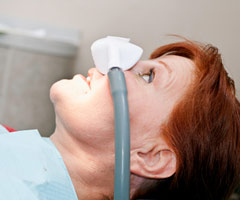Oral Sedation Dentistry
Oral sedation allows you to relax both your mind and body, and focus on feeling peaceful rather than anxious
(Continued)
Which Medication is Right for You?
While your dentist will decide which medications are appropriate for your treatment, being familiar with the different drugs available can be helpful for you. Knowledge about oral sedation is not only powerful — it is empowering.
There are several commonly prescribed medications, including, but not limited to Valium®, Halcion®, Sonata®, Ativan®, Vistaril® and Versed®. With the exception of Vistaril® and Sonata® they all belong to a class of medications called benzodiazepines. Benzodiazepines are prescribed for the treatment of anxiety, insomnia, agitation, seizures, and muscle spasms. Taken in small doses, they are highly effective at relieving the above mentioned conditions.
Each medication has a different duration of action (how long it affects you) and different half-life (how long it remains in your body). Dosages can vary greatly depending on whether swallowed whole or placed under the tongue in addition to the treatment protocols for which the sedation is being used. The drugs take effect anywhere from 20 minutes to an hour. Some varieties of the medication have “amnesic” properties, meaning that you remember little or nothing of your time in the dental chair after the procedure is completed.

Other Forms of Sedation Dentistry
Inhalation Conscious Sedation is also known as “Nitrous Oxide/Oxygen Sedation.” Nitrous oxide, commonly and inappropriately called laughing gas, has been used by dentists for nearly 100 years. It is an excellent analgesic (pain reliever), but a less effective anxiolytic (anti-anxiety) medication. It is administered through a nasal hood, which is similar to a small cup placed over your nose. Nitrous oxide is extremely safe because it is mixed directly with oxygen to provide you with a feeling of euphoria or light-headedness. All bodily functions remain essentially normal. You may experience a tingling sensation from the use of nitrous oxide. However, its effects wear off almost immediately so there is no “hangover effect.”
In combination with an oral sedative, nitrous oxide allows your dentist to fine-tune the exact amount of sedation needed to provide you with the best possible experience.
Intravenous (IV) Conscious Sedation also known as “Deep Conscious Sedation” is used by some dentists, and surgical specialists like oral surgeons and periodontists who must undertake specialized training and certification in IV use. With this type of sedation, medications are administered directly into the blood stream intravenously (intra-within, venous-vein). The main advantage of this method is that it works immediately and the level of sedation can be adjusted quickly and easily. There is a higher degree of risk associated with IV sedation since normal bodily functions especially heart rate, blood pressure and breathing can be altered necessitating specialized monitoring equipment. The drugs used for IV Sedation are more potent when given this way than when taken orally and amnesia may be more profound.
Finding the Right Dentist
Like any informed consumer, you will want to make sure that your dentist is qualified to provide sedation dentistry. It is a good idea to request information on your dentist's training, credentials, and the techniques that may be used prior to an appointment.
You Are Not Alone
Talk to your dentist about your fears and concerns so that together you can decide on the best treatment for you. It's important to remember that dentistry has come a long way. Years of research have been dedicated to studying and finding methods to alleviate pain and anxiety. There are safe and time-tested options available to ensure that you have a positive and painless experience. Step out from under the shadow of fear and into the calm of sedation dentistry. You are not alone and you don't have to be afraid anymore.

